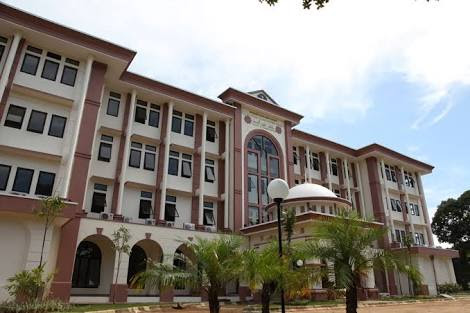IDENTIFY FACTORS AFFECTING STUDENT ACHIEVEMENT USING THE BINARY LOGISTIC REGRESSION ANALYSIS
IDENTIFIKASI FAKTOR-FAKTOR YANG MEMPENGARUHI PRESTASI SISWA MENGGUNAKAN ANALISIS REGRESI LOGISTIK BINER
Abstract
The success of students in completing their study program is indicated by the achievements reflected in their Grade Point Average (GPA). Grade Point Average (GPA) is expressed in numerical form and is an academic achievement calculated based on all courses taken in all semesters that have been passed by students. This study aims to obtain a model of external factors that affect Grade Point Average (GPA) and variables that affect Grade Point Average (GPA). The response variable in this study is Grade Point Average (GPA) which is categorical and divided into two categories. The method used is binary logistic regression analysis. This study used primary data with the research subjects being second, third, and fourth-semester students in the Mathematics Education Department of Alauddin Makassar State Islamic University. The indicators on the instrument can be categorized as valid and reliable to measure service variables, learning, facilities and infrastructure, and student interest in entering college. The results of binary logistic regression analysis show that service has a significant effect on Grade Point Average (GPA), besides that learning, facilities, infrastructure, and the number of students enrolling in college have an effect but are not significant on Grade Point Average (GPA).
Downloads
References
Agresti, A. (2019). An introduction to categorical data analysis (Third; R. S. T. David J. Balding, Noel A. C. Cressie, Garrett M. Fitzmaurice, GeofH. Givens, Harvey Goldstein, Geert Molenberghs, DavidW. Scott, Adrian F. M. Smith, Ed.). Florida: John Wiley & Sons, Inc.
Bozpolat, E. (2016). Investigation of the self-regulated learning strategies of students from the faculty of education using ordinal logistic regression analysis. Kuram ve Uygulamada Egitim Bilimleri, 16(1), 301–318. https://doi.org/10.12738/estp.2016.1.0281.
Dhania, D. R. (2010). Pengaruh stres kerja, beban kerja terhadap kepuasan kerja (studi pada medical representatif di kota kudus). Jurnal Psikologi Universitas Muria Kudus, 1(1), 15–23.
Frankel, J. R., Wallen, N. E., & Hyun, H. H. (2020). How to design and evaluate research in education (2nd ed., vol. 21; v. malinee & v. b. associates, eds.). New York: The McGraw-Hill Companies, Inc.
Hair, J. F., Black, W. C., Babin, B. J., Anderson, R. E., Black, W. C., & Anderson, R. E. (2018). Multivariate data analysis. https://doi.org/10.1002/9781119409137.ch4.
Hosmer, D. W., & Lemeshow, S. (2000). Applied logistic regression by David W. New York: John Wiley & Sons, Inc.
Indrajit, R. E., & Djokopranoto, R. (2004). Manajemen perguruan tinggi moderen.
Nadziruddin, U. (2006). Faktor internal yang berkontribusi terhadap pencapaian indeks prestasi kumulatif pada mahasiswa program A FIK unpad. Ilmu Pendidikan.
Oke, J. A.Akinkunmi, W. B, Etebefia, S. O. (2019). Use of correlation, tolerance and variance inflation factor. Global Scientific Journal, 7(5), 652–659.
Peng, C. Y. J., Lee, K. L., & Ingersoll, G. M. (2002). An introduction to logistic regression analysis and reporting. Journal of Educational Research, 96(1), 3–14. https://doi.org/10.1080/00220670209598786.
Rugutt, J. K., & Chemosit, C. C. (2005). A study of factors that influence college academic achievement: a structural equation modeling approach. Journal of Educational Research & Policy Studies, 5(1), 66–90. Retrieved from https://eric.ed.gov/?id=EJ846830.
Sayidah, N., Ady, S. U., Supriyati, J., Sutarmin, Winedar, M., Mulyaningtyas, A., & Assagaf, A. (2019). Quality and university governance in Indonesia. International Journal of Higher Education, 8(4), 10–17. https://doi.org/10.5430/ijhe.v8n4p10.
Semer, C., & Harmening, D. S. (2015). Exploring significant factors that impact the academic success of student veterans in higher education. Journal of Higher Education Theory & Practice, 15(7).
Senaviratna, N. A. M. R., & A. Cooray, T. M. J. (2019). Diagnosing multicollinearity of logistic regression model. Asian Journal of Probability and Statistics, 5(2), 1–9. https://doi.org/10.9734/ajpas/2019/v5i230132.
Setyawati, D. (2020). Analysis of perceptions towards the rooftop photovoltaic solar system policy in Indonesia. Energy Policy, 1444, 111569. https://doi.org/10.1016/j.enpol.2020.111569.
Suti, M., Syahdi, M. Z., & Didiharyono. (2020). Tata kelola perguruan tinggi dalam era teknologi informasi dan digitalisasi. JEMMA (Journal of Economic, Management and Accounting), 3(2), 203. https://doi.org/10.35914/jemma.v3i2.635.
Sweet, S., & Martin, K. G. (2014). Data Analysis with SPSS: A first Course in Applied Statistics. Boston.
Syamsuryadin, S., & Wahyuniati, C. F. S. (2017). Uji validitas dan reliabilitas instrumen penelitian kuantitatif. Jorpres (Jurnal Olahraga Prestasi), 13(1), 53–59. https://doi.org/10.21831/jorpres.v13i1.12884.
Tampil, Y., Komaliq, H., & Langi, Y. (2017). Analisis regresi logistik untuk menentukan faktor-faktor yang mempengaruhi indeks prestasi kumulatif (IPK) mahasiswa FMIPA Universitas Sam Ratulangi Manado. D’CARTESIAN: Jurnal Matematika Dan Aplikasi, 6(2), 56–62. https://doi.org/10.35799/dc.6.2.2017.17023.
Yanti, R., Windarto, A. P., & Suhada, S. (2019). Analisis faktor yang mempengaruhi ipk mahasiswa terhadap penentuan kualitas proses pembelajaran dengan metode electre II. KOMIK (Konferensi Nasional Teknologi Informasi Dan Komputer), 3(1), 36–41. https://doi.org/10.30865/komik.v3i1.1696.
Copyright (c) 2023 Nursalam, Qardawi Hamzah, Baharuddin, Andi Kusumayanti, A. Sriyanti

This work is licensed under a Creative Commons Attribution 4.0 International License.

